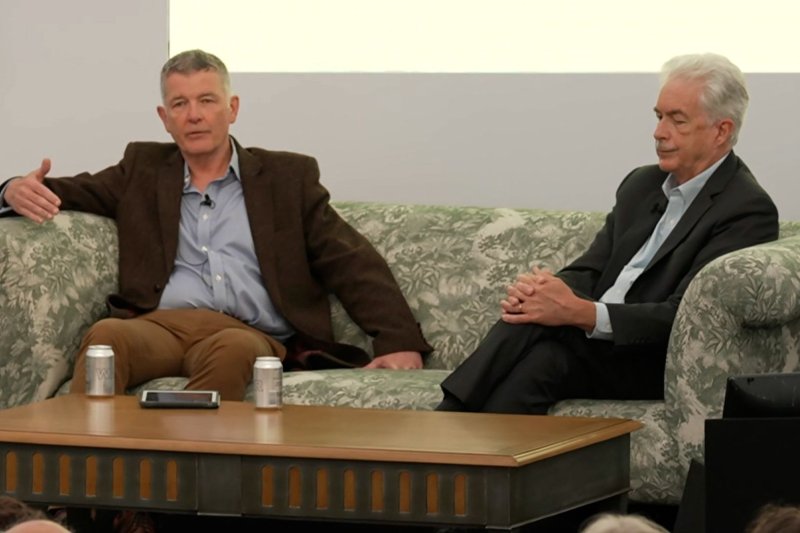CIA Boss Says West Should Not Be Intimidated by Russia’s Nuclear Threats
Western leaders should not be intimidated by Kremlin threats of nuclear escalation, the head of the CIA said on Saturday, amid a debate over whether Anglo-French Storm Shadow missiles should be used inside Russia.
Bill Burns, on a visit to London alongside the head of MI6, said the US had brushed off a previous Russian nuclear scare in autumn 2022, demonstrating that threats from Moscow should not always be taken literally.
“Putin’s a bully. He’s going to continue to sabre rattle from time to time,” Burns said. “We cannot afford to be intimidated by that sabre rattling … we got to be mindful of it. The US has provided enormous support for Ukraine, and I’m sure the president will consider other ways in which we can support them.”
The CIA director also said the US was working very hard on fresh proposals for a ceasefire in Gaza with new “texts and creative formulas”. A new plan, being devised with the help of mediators from Qatar and Egypt, would emerge, he hoped, “in the next several days”.
However, it was unclear, Burns added, whether Benjamin Netanyahu, the Israeli prime minister, and the Hamas chief Yahya Sinwar were willing to strike a deal. It was a question of political will, he said: “Whether or not leaders on both sides recognise that enough is enough and that the time has come to finally make some hard choices.”
Israel had succeeded in “severely degrading” Hamas’s military capabilities over the past 11 months, Burns said, but had not eliminated the movement in a war that had created a severe humanitarian crisis. “It is also a movement and an idea,” the spy chief said, and you could only “kill an idea with a better idea”, meaning there needed to be some long-term hope for Palestinians.
On Ukraine, the veteran spy chief was asked whether there was too much nervousness in Washington and other western capitals about the risk of escalating the war by giving permission for Storm Shadow, a missile with a range of at least 190 miles, to be used inside Russia.
“None of us should take lightly the risks of escalation,” Burns told an audience at a Financial Times event in London – and said there had actually been a belief within the CIA that Russia might use tactical nuclear weapons on the battlefield in Ukraine in the first year of the war.
“There was a moment in the fall [autumn] of 2022 when I think there was a genuine risk of potential use of tactical nuclear weapons,” by Russia in Ukraine, Burns said, but he believed such concerns should not be taken too seriously. “I never thought … we should be unnecessarily intimidated by that,” he added.
At the time, Russian troops had been pushed back in northern Ukraine and had abandoned Kherson in the south, prompting a belief that Russia might seek to use a nuclear weapon if a rout developed. In any event, the frontline stabilised shortly afterwards.
Burns said that Joe Biden, the US president, had sent him to pass on a direct warning to Sergey Naryshkin, the head of the Russian foreign intelligence service, at a meeting in Turkey in November 2022 “to make very clear what the consequences of that kind of escalation would be” – and that a similar approach was in place today.
So far, the White House has been notably hesitant about allowing the use of Storm Shadow and other long-range missiles inside Russia, such as the US-made Atacms, despite repeated pleas from Ukraine’s president, Volodymyr Zelenskiy, including one made on Friday.
Burns voiced concern that Iran was considering whether to supply ballistic missiles to Russia, but would not confirm whether the CIA believed it had done so. It would be a “dramatic escalation” of the relationship between the two countries; Tehran so far has supplied only less effective drones for Russia to use in Ukraine.
Burns and his British counterpart, the MI6 chief, Sir Richard Moore, had never appeared in public together before the surprise appearance at the event at London’s Kenwood House in Hampstead. Tight security meant that audience members were told only 15 minutes in advance who would be appearing.
Moore said there were concerns that Russian spies were becoming increasingly reckless in the UK, Europe and elsewhere as the war in Ukraine continues. “I think Russian intelligence services have gone a bit feral, frankly,” the British spy chief said, as shown by a spate of arson attacks in the UK and elsewhere in Europe.
(Source: The Guardian)













